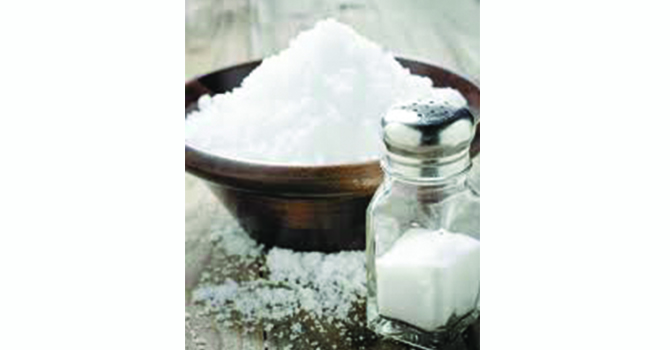Right amount of salt intake keeps ailments at bay

By Nayak Paudel
Morang, May 25: The World Health Organisation recommends consumption of less than 2 grams of sodium or 5 grams of salt per day. However, the amount of salt intake is nearly double when compared to the recommendation in context of Nepal.
The ‘Non-communicable Disease Risk Factors: STEPS Survey Nepal 2019’ conducted by the Nepal Health Research Council (NHRC) shows that average salt intake is 9.1 grams per day among the Nepalis.
Excessive salt intake is one of a major risk factors behind diseases such as hypertension, a major cause of premature deaths globally. A research carried out by Nepal Development Society in May 2018 shows that one out of four Nepalis suffer from hypertension.
However, hypertension is not the only disease caused by high salt intake.
“High amount of salt intake also causes diseases such as high blood pressure, cardiovascular disease, stroke and coronary heart disease,” said Dr Yadav Kumar Deo Bhatta, senior consultant cardiologist at Norvic International Hospital.
According to health experts, direct consumption of salt is not the only factor which results in excessive salt intake.
“The trend of consumption of processed foods, packaged foods and salty sauces is high among Nepalis. Such foods are likely to have higher content of salt,” Bhatta added.
As per the survey conducted by NHRC, 5.6 per cent adults reported adding salt often or always to foods while eating and 4.5 per cent adults reported adding salty sauces. In general, 9.2 per cent of adults stated of adding salt or salty sauces often.
Similarly, the survey also showed that 19.5 per cent of adults often consumed processed foods high in salt.
Experts argue that the concerned authorities should come up with plans and policies to increase awareness among people regarding salt intake.
As per the World Health Organisation (WHO), reducing salt intake is one of the most cost-effective measures to improve health of people.
The WHO also states that around 2.5 million deaths could be prevented each year if the global salt consumption were reduced to the recommended level. The member states of WHO have
agreed to reduce salt intake of the global population by 30 per cent by 2025.
In the report of the survey by NHRC, it has suggested bringing forth policies such as food product reformulation, establishing supportive environment in public institutions, communication and mass media campaigns and front-of-pack labeling.
“The trend of excessive salt intake is higher in global context. We need proper plans and policies alongside excessive awareness among the public to make them aware of the necessary amount of salt intake,” said Meghnath Dhimal, senior research officer at NHRC.
As per the experts, establishing government body such as Food and Drug Administration (FDA) can help the government to regulate processed foods which have higher salt quantity.
The government, in its policy and programme for the next fiscal year, has already announced to establish FDA and Centre for Disease Control (CDC).
However, experts argue that awareness of average salt intake, not more than 5 gram of salt as per recommended by WHO, should be a priority.
“Management of average salt intake is a way to prevent many individuals from different health issues. Since less salt consumption also affects human health, government should make people aware regarding importance of average intake of salt,” said Bhatta.
As per the report by NHRC, 61.6 per cent of adults did not know about the amount of recommended salt intake for proper health.
The report also showed that 74.9 per cent of adults perceived that their salt intake was ‘just right’ and only 10.6 per cent perceived it to be in excess.
Similarly, only 2.6 per cent of adults reported to have been currently doing something to reduce their salt intake.
Recent News

Do not make expressions casting dout on election: EC
14 Apr, 2022
CM Bhatta says may New Year 2079 BS inspire positive thinking
14 Apr, 2022
Three new cases, 44 recoveries in 24 hours
14 Apr, 2022
689 climbers of 84 teams so far acquire permits for climbing various peaks this spring season
14 Apr, 2022
How the rising cost of living crisis is impacting Nepal
14 Apr, 2022
US military confirms an interstellar meteor collided with Earth
14 Apr, 2022
Valneva Covid vaccine approved for use in UK
14 Apr, 2022
Chair Prachanda highlights need of unity among Maoist, Communist forces
14 Apr, 2022
Ranbir Kapoor and Alia Bhatt: Bollywood toasts star couple on wedding
14 Apr, 2022
President Bhandari confers decorations (Photo Feature)
14 Apr, 2022











